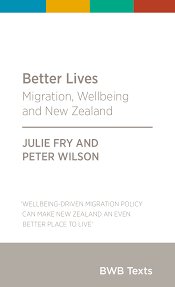
https://www.newsroom.co.nz/2018/04/19/105597/comment-a-new-way-of-seeing...
link about the book
https://www.bwb.co.nz/books/better-lives
The authors of a new book address how a 'wellbeing' approach can help New Zealand make better decisions on migration policy
The new Government has placed the wellbeing of people at the centre of its policy agenda.
Precisely what “wellbeing” means has troubled philosophers for centuries. Is it happiness, material comfort, absence of illness, a positive mood, loving and being loved? Can wellbeing be measured, manufactured or redistributed?
These are not just abstract concepts. The Government has promised that 2019 will see a “wellbeing Budget”. How will it decide what programmes produce the most wellbeing, for the right people, at the least cost? Whose wellbeing is the Government thinking about: everyone’s, or only those with low levels of wellbeing? How will the Government, and taxpayers and voters, know if the Government has succeeded in increasing wellbeing?
These are all practical matters that are currently occupying the time and attention of decision-makers and their advisers within government.
In our new book Better Lives: Migration, Wellbeing and New Zealand, we have developed a practical framework for addressing these questions. We demonstrate how a wellbeing approach can be used to make better decisions – in this case, on migration policy.
From the drafting of the Treaty of Waitangi to today, migration has been an important issue in New Zealand’s history. People have debated, at length and often passionately, whether and how much migration is good for our country.
Just saying that you want to focus on wellbeing, not GDP, doesn’t reduce the cost of any programme or increase its capacity to change lives.
Economists have contributed to these discussions, and typically conclude that immigration has small positive impacts on the GDP per capita of receiving countries. But justifying high levels of migration by the fact that it boosts GDP or even GDP per capita has done little to resolve debates about migration or address the anti-migrant feelings that contributed to the Trump presidency, Brexit and the rise of the far right in Europe.
Following Nobel prize-winning economist Amartya Sen, we define wellbeing as the capabilities of people to live the life they value and have reason to value.
Our framework eschews the simplicity of a single number – such as GDP per capita – in favour of something that has broader, richer coverage, but is more difficult, subtle and nuanced – and consequently harder to measure.
We use the tools of economics to assess the effects of migration on twelve aspects of life important to the wellbeing of New Zealanders over time, including civic engagement, the environment and the Crown’s relationship with Treaty partners (the twelve are the eleven dimensions from the OECD’s Better Life framework, plus one dealing with Treaty issues).
Using wellbeing as a goal does not overcome the central problem that economics seeks to solve: how to use resources that are scarce and have alternative uses. Just saying that you want to focus on wellbeing, not GDP, doesn’t reduce the cost of any programme or increase its capacity to change lives.
How does a wellbeing focus change how you might think about the costs and benefits of migration?
When our focus is on maximising GDP per capita, older family members are often viewed as an avoidable cost (especially if they are not working, didn’t pay tax and are likely to need high cost health and aged care). But when maximising wellbeing, we would consider the benefits migrant grandparents bring (such as helping to maintain language and culture, or providing childcare).
Similarly, taking account of commitments made in the Treaty of Waitangi when developing migration policy will require Treaty partners to work together to develop solutions, a significant change from current practice in this space. We might follow the suggestion of University of Waikato academics Tahu Kukutai and Arama Rata, and seek to introduce a tika (appropriate behaviour) approach to migration. That is, to ask what is right, just, fair or proper. Their suggestion is based on the idea of manaakitanga: the obligation of mana whenua to show care, respect, kindness and hospitality to manuhiri (visitors and guests). A manaakitanga approach would not seek to stop immigration, and the mutual benefits of migration for migrants and New Zealand would still be sought.
Our work is not intended to provide the last word, or indeed the only word, on how migration can improve wellbeing. This is an area where there is a lot of interesting activity going on, including Treasury’s work developing its Living Standards Framework, and the work of wellbeing researcher Arthur Grimes and his colleagues on how thinking about peoples’ assessments of their own wellbeing can bring new insights to policy development.
Rather, our goal is to present a systematic way of thinking about migration that allows us to take account of all the things that New Zealanders care about in living lives they value and have reason to value.
Julie Fry is a consulting economist who has worked on migration policy issues since the early 1990s, designing programmes and advising agencies including The Treasury, Te Puni Kōkiri, and HM Treasury in London. Peter Wilson is a Principal Economist and Head of Auckland Business at the New Zealand Institute of Economic Research.











Add new comment